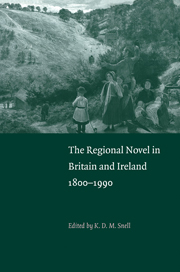Book contents
- Frontmatter
- Contents
- Preface and acknowledgements
- 1 The regional novel: themes for interdisciplinary research
- 2 Regionalism and nationalism: Maria Edgeworth, Walter Scott and the definition of Britishness
- 3 The deep romance of Manchester: Gaskell's ‘Mary Barton’
- 4 Geographies of Hardy's Wessex
- 5 Gender and Cornwall: Charles Kingsley to Daphne du Maurier
- 6 James Joyce and mythic realism
- 7 Cookson, Chaplin and Common: three northern writers in 1951
- 8 Emyr Humphreys: regional novelist?
- 9 Scotland and the regional novel
- 10 Mapping the modern city: Alan Sillitoe's Nottingham novels
- Index
1 - The regional novel: themes for interdisciplinary research
Published online by Cambridge University Press: 18 December 2009
- Frontmatter
- Contents
- Preface and acknowledgements
- 1 The regional novel: themes for interdisciplinary research
- 2 Regionalism and nationalism: Maria Edgeworth, Walter Scott and the definition of Britishness
- 3 The deep romance of Manchester: Gaskell's ‘Mary Barton’
- 4 Geographies of Hardy's Wessex
- 5 Gender and Cornwall: Charles Kingsley to Daphne du Maurier
- 6 James Joyce and mythic realism
- 7 Cookson, Chaplin and Common: three northern writers in 1951
- 8 Emyr Humphreys: regional novelist?
- 9 Scotland and the regional novel
- 10 Mapping the modern city: Alan Sillitoe's Nottingham novels
- Index
Summary
DEFINITION
‘Novels of character and environment’ – that was how Hardy described his ‘Wessex novels’. What is meant by ‘the regional novel’? Inevitably, there are problems of definition, even definitions that rival each other in scope. Yet most readers agree about who the quintessential ‘regional’ writers are. The definitions on offer have much in common, although there will always be a large number of novels that fall into borderline categories. By ‘regional novel’ I mean fiction that is set in a recognisable region, and which describes features distinguishing the life, social relations, customs, language, dialect, or other aspects of the culture of that area and its people. Fiction with a strong sense of local geography, topography or landscape is also covered by this definition. In such writing a particular place or regional culture may perhaps be used to illustrate an aspect of life in general, or the effects of a particular environment upon the people living in it. And one usually expects to find certain characteristics in a regional novel: detailed description of a place, setting or region, whether urban or rural, which bears an approximation to a real place; characters usually of working-or middle-class origin (although in some regional novels people of these classes may be absent, and in a few the focus may be on a family or lineage and its connection with local landscape or history); dialogue represented with some striving for realism; and attempted verisimilitude.
- Type
- Chapter
- Information
- The Regional Novel in Britain and Ireland1800–1990, pp. 1 - 53Publisher: Cambridge University PressPrint publication year: 1998
- 4
- Cited by



